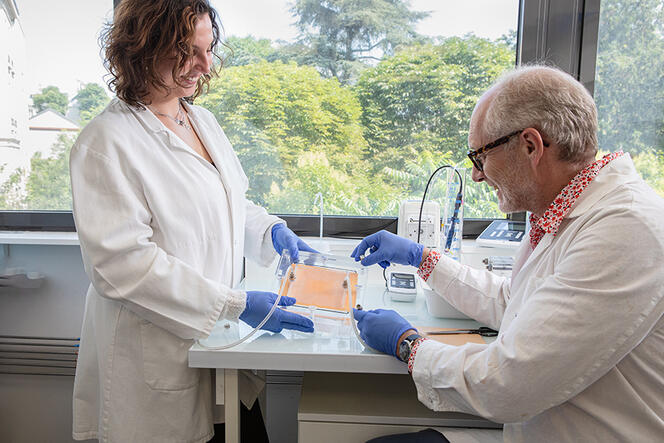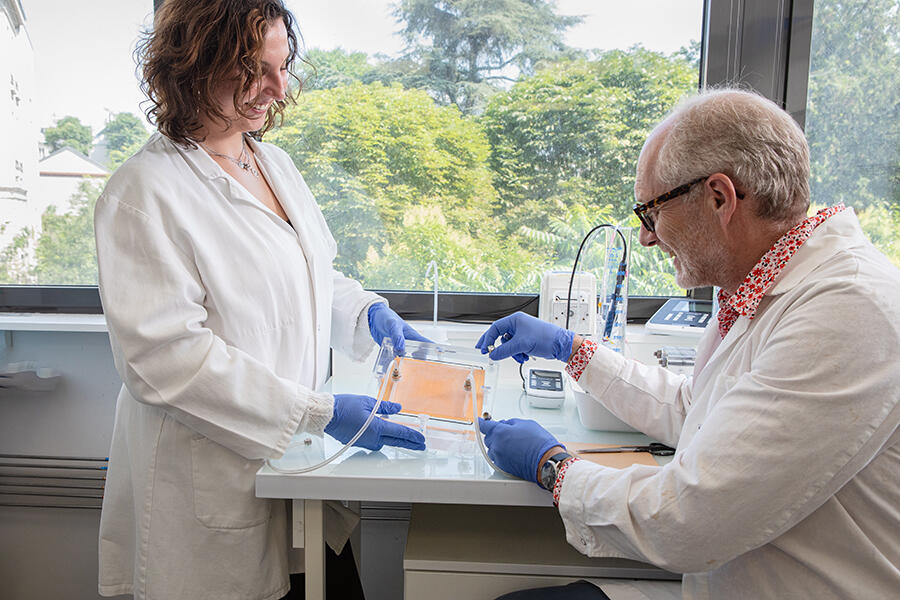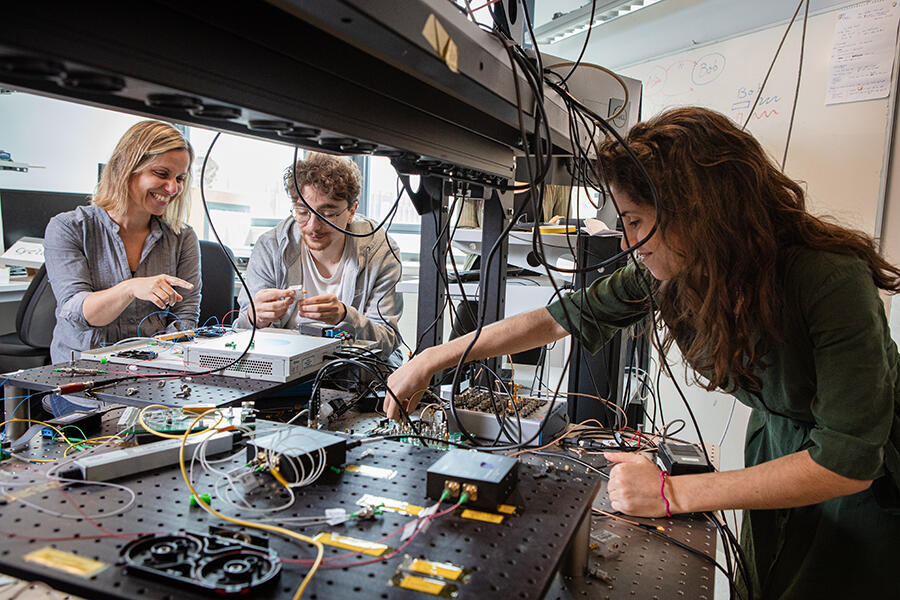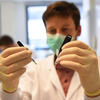You are here
Innovation hat trick
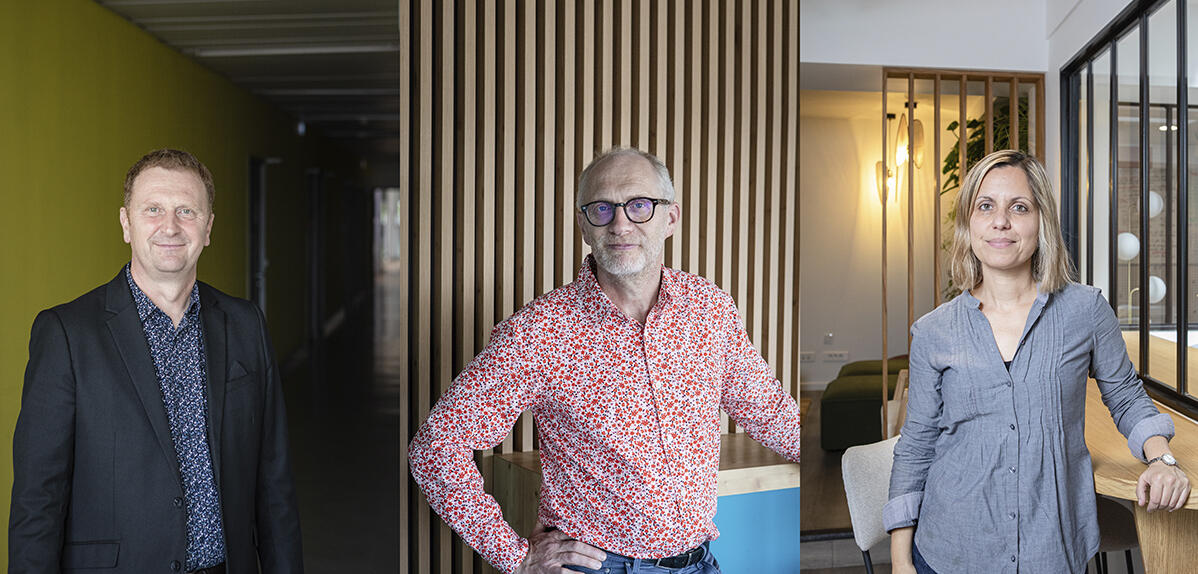
Cyril Aymonier
Putting water into special conditions of temperature and pressure, known as 'supercritical' conditions, can make it miscible with oil while no longer solubilising salts. In general, solvents in supercritical conditions start to behave in a manner that is somewhere between gas and liquid. This hybrid behaviour notably makes it possible to synthesise, shape and recycle materials that cannot be attained using conventional approaches. Cyril Aymonier explains that "supercritical fluid technologies are part of the circular economy and sustainable development. They make it possible to increase the proportion of recycled raw materials in new materials, among other things."
This CNRS research professor is a world-renowned expert in these supercritical fluid media and the director of the Institute of Condensed Matter Chemistry of Bordeaux1. He designs new materials and raw materials for recycling, while also developing processes adapted to supercritical conditions.
Cyril Aymonier's research has led to nearly fifty patents being filed, including over thirty resulting from collaboration contracts with industrial partners like Safran, Arkema, Imerys, Renault, Essilor or L'Électrolyse. These partnerships with industry involve highly varied applications including the synthesis of artificial minerals, materials for catalysis and aeronautics, and the recycling of photovoltaic cells, magnets, food packaging and thermoplastics.
In 2019 his work also led to the creation of the start-up Idelam, which uses unique delamination technology to recycle complex multi-component materials. He is very much involved in training through research, having supervised over seventy theses and post-doctorates, over half of which were in partnership with companies. He justifies this by pointing out that most of the questions that interest industry can be transposed into scientific problems which "is why my activities range from very fundamental research to technology transfer in partnership with industry". This year's innovation medal complements the CNRS Bronze Medal he was awarded in 2011.
Lydéric Bocquet
Water is a 'blue gold' that never ceases to amaze us. Recent nanofluidics research has shown that water flows acquire properties at nanometric scales - such as when passing through carbon nanotubes - that can lead to unexpected potential applications. Generating electricity, writing at nanoscales, removing alcohol from drinks and (coming soon) desalinating seawater are just some of the applications that have derived from of Lydéric Bocquet's basic research. He is a CNRS physics research professor working at the École normale supérieure's Physics Laboratory2 who has now filed twelve patents (notably on membranes) and created four start-ups.
Sweetch Energy was founded in 2015 and works on creating renewable energy from the differences in salinitybetween seawater and freshwater. Lydéric Bocquet explains the incredible potential of this "carbon-free, non-intermittent energy" given that "the potential global reservoir is estimated at between 1000 and 2000 GW - the equivalent of 1000 to 2000 nuclear reactors when there are currently only 400 nuclear reactors on Earth". The recently launched Ilion start-up also draws on the Ocean to develop an innovative seawater desalination technique. Since 2020 Hummink has marketed a nanometric printing technology that works on large surfaces with no need for a clean room. Finally, Altr uses graphene oxide membranes to remove alcohol from drinks like wine and beer. Lydéric Bocquet's work has a wide variety of applications which is helped by Lydéric Bocquet also working as a scientific consultant for various companies, including Saint-Gobain and Plastic Omnium.
However Lydéric Bocquet's strong involvement with industry in no way detracts from his academic work. He is a member of the Académie des Sciences, a professor at ENS Paris and was awarded the 2017 CNRS Silver Medal. Alongside his innovation research, Lydéric Bocquet also works in the field of nanofluidics. His research focuses on the quantum engineering of flows on nanometric scales and designing ionic nanomachines that mimic different biological functions, including those of neurons, and are capable of certain elementary learning tasks.
Eleni Diamanti
And what if light helped the quantum computing revolution reach its full potential? This is the objective Eleni Diamanti, a CNRS research professor with the LIP6 laboratory3 , is working towards. She uses photons as quantum information carriers and develops different technological solutions for quantum communication networks. She has also perfected cryptographic protocols, particularly for robust key exchange in the event of future attacks by quantum computers.
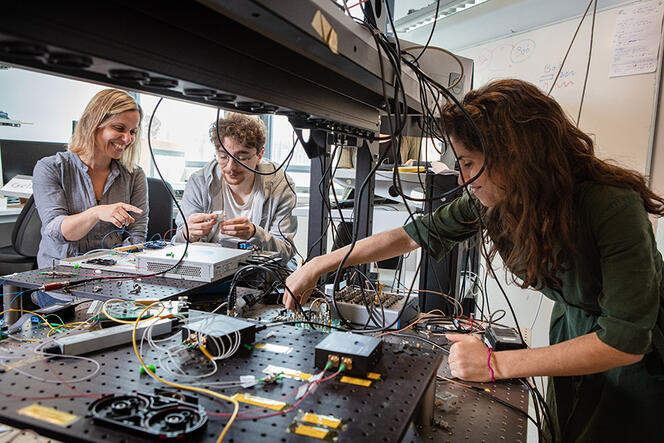
As well as her academic work, the research professor works closely with innovation stakeholders. She "doesn't like things that are set in stone", preferring "the new ideas and directions the collaborative research ecosystem offers". In 2022 she co-founded the Welinq start-up which has become the French standard bearer in quantum technologies. Weling provides solutions based on quantum memories that connect several quantum processors to overcome the computing power limits involved when working with individual processors. Welinq also rolls out its technology in long-distance quantum communication infrastructures.
Eleni Diamanti is the director of the Paris Centre for Quantum Technologies made up of twenty-three laboratories working on quantum technologies. The researcher's expertise has led to numerous partnerships with industrial companies like Airbus, Deutsche Telekom, Orange or Thales Alenia Space and institutions such as the European Space Agency and Onera. She finds this situation particularly interesting, explaining that "I've seen my research field evolve from a particularly specialised niche concern to attracting a great deal of interest, including from major industrial groups and governments". The attention paid to Eleni Diamanti's work was recognised with the CNRS Silver Medal she was awarded early this year.


